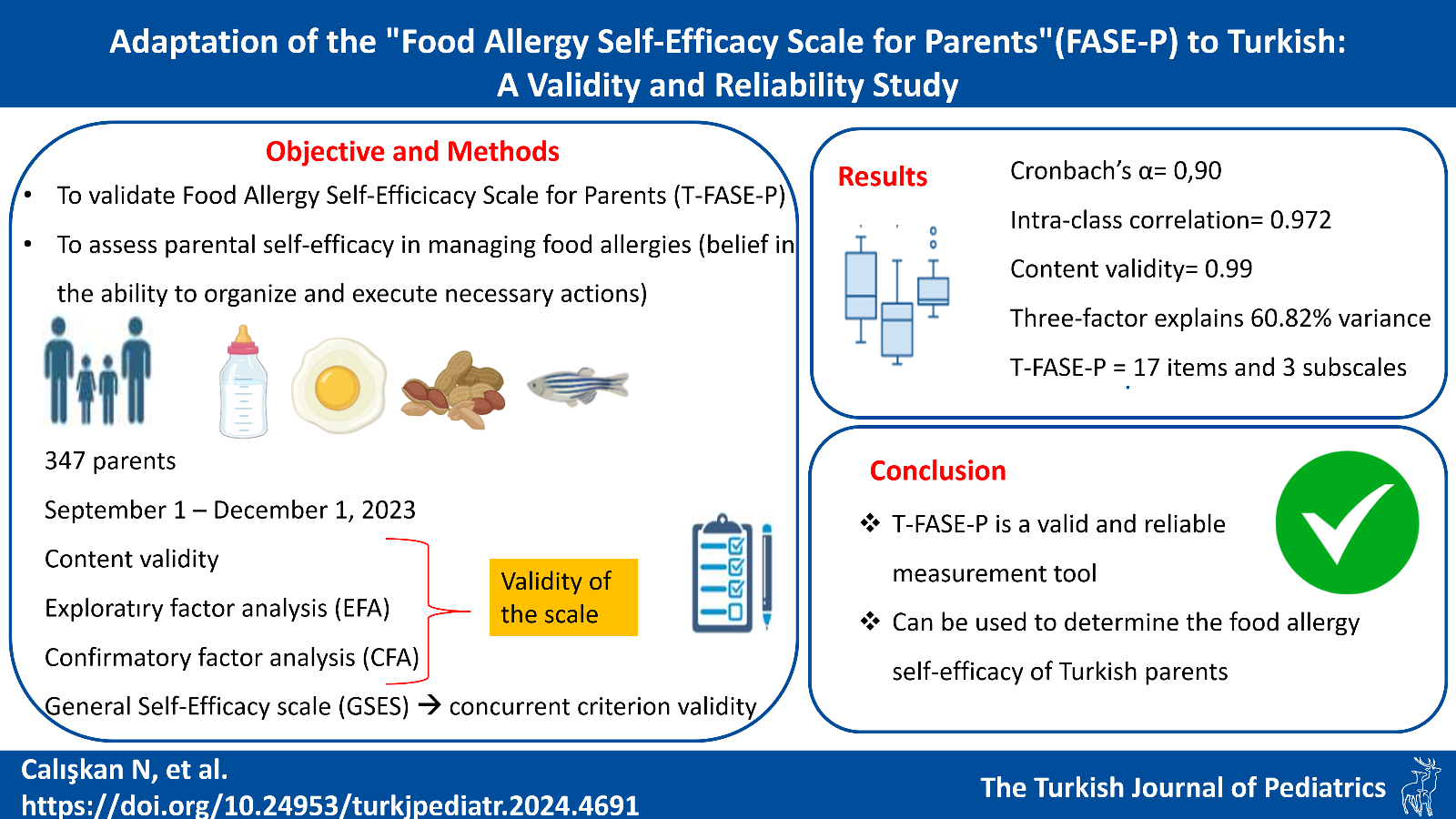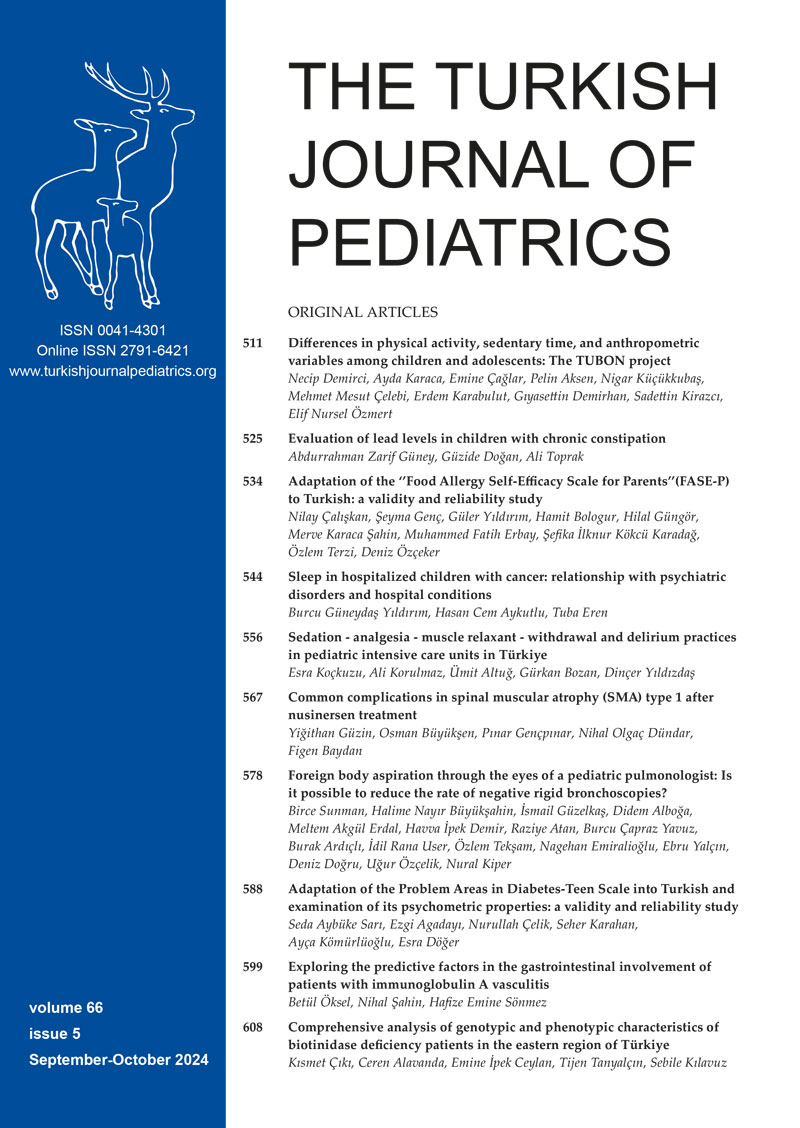Graphical Abstract

Abstract
Background. Food allergy is a public health issue that has a significant impact on the lives of families. Parental self-efficacy/confidence is important in managing food allergies. The aim of this study is to validate the “Food Allergy Self-Efficacy Scale for Parents” (FASE-P) and assess parental self-efficacy in managing their child’s food allergy.
Methods. Turkish version of the FASE-P (T-FASE-P) was administered to 347 parents of children aged 0-18 who had been followed for at least one month due to food allergy at the Pediatric Allergy Clinic of Prof. Dr. Cemil Taşcıoğlu City Hospital between September 1 and December 31, 2023, through face-to-face interviews and online surveys for parents of children with food allergies from the general population. Content validity, exploratory factor analysis (EFA), and confirmatory factor analysis (CFA) were conducted to evaluate the validity of the scale. General Self-Efficacy Scale (GSES) was used for concurrent criterion validity. Internal consistency analysis, test-retest application, and item analysis were conducted to assess its reliability.
Results. T-FASE-P scale initially contained 21 items, and the Cronbach’s alpha coefficient (α) calculated in this form was found to be 0.89. Later, when 4 items were excluded, the 17-item version of the scale was calculated as α=0.90. The intra-class correlation coefficient between the test and re-test was found to be 0.972. The content validity index value of the scale was calculated as 0.99, indicating that the content validity was at a sufficient level. In the EFA, it was determined that the scale formed a three-factor structural model and that this model explained 60.82% of the total variance. As a result of the CFA, the fit indices were calculated as χ2/df=2.341, GFI=0.919, TLI=0.950, indicating a good level of fit. Based on the analysis results, T-FASE-P consists of 17 items and three subscales.
Conclusion. T-FASE-P scale is a valid and reliable measurement tool that can be used to determine the food allergy self-efficacy of Turkish parents.
Keywords: children, food allergy, parents, self-efficacy
References
- Peters RL, Krawiec M, Koplin JJ, Santos AF. Update on food allergy. Pediatr Allergy Immunol 2021; 32: 647-657. https://doi.org/10.1111/pai.13443
- Seth D, Poowutikul P, Pansare M, Kamat D. Food allergy: a review. Pediatr Ann 2020; 49: e50-e58. https://doi.org/10.3928/19382359-20191206-01
- Boyce JA, Assa’ad A, Burks AW, et al. Guidelines for the diagnosis and management of food allergy in the United States: summary of the NIAID-sponsored expert panel report. Nutr Res 2011; 31: 61-75. https://doi.org/10.1016/j.nutres.2011.01.001
- Brown D, Negris O, Gupta R, et al. Food allergy-related bullying and associated peer dynamics among black and white children in the FORWARD study. Ann Allergy Asthma Immunol 2021; 126: 255-263.e1. https://doi.org/10.1016/j.anai.2020.10.013
- Pappalardo AA, Herbert L, Warren C, et al. Self-efficacy among caregivers of children with food allergy: a cohort study. J Pediatr Psychol 2022; 47: 674-684. https://doi.org/10.1093/jpepsy/jsab137
- King RM, Knibb RC, Hourihane JO. Impact of peanut allergy on quality of life, stress and anxiety in the family. Allergy 2009; 64: 461-468. https://doi.org/10.1111/j.1398-9995.2008.01843.x
- Bollinger ME, Dahlquist LM, Mudd K, Sonntag C, Dillinger L, McKenna K. The impact of food allergy on the daily activities of children and their families. Ann Allergy Asthma Immunol 2006; 96: 415-421. https://doi.org/10.1016/S1081-1206(10)60908-8
- Cummings AJ, Knibb RC, King RM, Lucas JS. The psychosocial impact of food allergy and food hypersensitivity in children, adolescents and their families: a review. Allergy 2010; 65: 933-945. https://doi.org/10.1111/j.1398-9995.2010.02342.x
- Ward CE, Greenhawt MJ. Treatment of allergic reactions and quality of life among caregivers of food-allergic children. Ann Allergy Asthma Immunol 2015; 114: 312-318.e2. https://doi.org/10.1016/j.anai.2014.12.022
- Howe L, Franxman T, Teich E, Greenhawt M. What affects quality of life among caregivers of food-allergic children? Ann Allergy Asthma Immunol 2014; 113: 69-74.e2. https://doi.org/10.1016/j.anai.2014.04.016
- Kılıç N, Kaya Ş, Taşçı G, Özsoy F, Kılıç M. Quality of life in children with food allergies, psychiatric symptoms, and caregiving burden of their mothers. Allergol Immunopathol (Madr) 2023; 51: 48-56. https://doi.org/10.15586/aei.v51i5.860
- Yilmaz O, Kacar AS, Gogebakan E, et al. The relationship between dietary elimination and maternal psychopathology in breastfeeding mothers of infants with food allergy. Pediatr Allergy Immunol 2022; 33: e13670. https://doi.org/10.1111/pai.13670
- Altıntaş DU, Büyüktiryaki AB, Çağdaş Ayvaz DN, et al. Besin Alerjisi: Türk Ulusal Rehberi 2017. Astım Allerji İmmünoloji 2017; 15: S81.
- Mandell D, Curtis R, Gold M, Hardie S. Anaphylaxis: how do you live with it? Health Soc Work 2005; 30: 325-335. https://doi.org/10.1093/hsw/30.4.325
- Akeson N, Worth A, Sheikh A. The psychosocial impact of anaphylaxis on young people and their parents. Clin Exp Allergy 2007; 37: 1213-1220. https://doi.org/10.1111/j.1365-2222.2007.02758.x
- Knibb RC, Barnes C, Stalker C. Parental self-efficacy in managing food allergy and mental health predicts food allergy-related quality of life. Pediatr Allergy Immunol 2016; 27: 459-464. https://doi.org/10.1111/pai.12569
- Yildirim F, Ilhan IO. The validity and reliability of the general self-efficacy scale-Turkish form. Turk Psikiyatri Derg 2010; 21: 301-308.
- Bravo L, Killela MK, Reyes BL, et al. Self-management, self-efficacy, and health-related quality of life in children with chronic ıllness and medical complexity. J Pediatr Health Care 2020; 34: 304-314. https://doi.org/10.1016/j.pedhc.2019.11.009
- Kim Y, Park HR. Structural equation model of health-related quality of life in school age children with asthma. J Korean Acad Nurs 2018; 48: 96-108. https://doi.org/10.4040/jkan.2018.48.1.96
- Çapık C, Gözüm S, Aksayan S. Intercultural scale adaptation stages, language and culture adaptation: updated guideline. Florence Nightingale J Nurs 2018; 26: 199-210. https://doi.org/10.26650/FNJN397481
- Knibb RC, Barnes C, Stalker C. Parental confidence in managing food allergy: development and validation of the Food Allergy Self-Efficacy Scale for Parents (FASE-P). Clin Exp Allergy 2015; 45: 1681-1689. https://doi.org/10.1111/cea.12599
- Worthington RL, Whittaker TA. Scale development research: a content analysis and recommendations for best practices. The Counseling Psychologist 2006; 34: 806–838. https://doi.org/10.1177/0011000006288127
- Büyüköztürk S. Veri analizi el kitabi. Ankara: Pegem A Yayıncılık; 2004.
- Schermelleh-Engel K, Moosbrugger H, Müller H. Evaluating the fit of structural equation models: test of significance and descriptive goodness-of-fit measures. Methods of Psychological Research Online 2003; 8: 23-74.
- Coleman PK, Karraker KH. Parenting self-efficacy among mothers of school-age children: conceptualization, measurement, and correlates. Family Relations 2000; 49: 13-24. https://doi.org/10.1111/j.1741-3729.2000.00013.x
Copyright and license
Copyright © 2024 The Author(s). This is an open access article distributed under the Creative Commons Attribution License (CC BY), which permits unrestricted use, distribution, and reproduction in any medium or format, provided the original work is properly cited.















